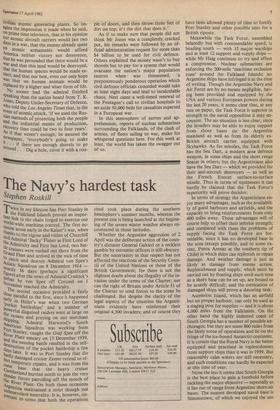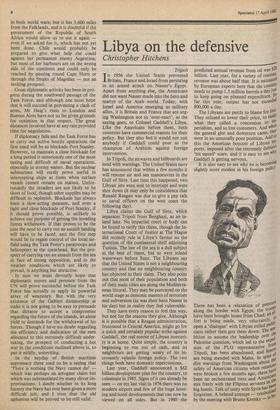The Navy's hardest task
Stephen Roskill
Twice in my lifetime has Port Stanley in the Falkland Islands proved an impor- tant link in the chain forged to exercise our World-wide maritime control. The first oc- casion arose early in the Kaiser's war, when thanks to the vigour and vision of Churchill and Admiral 'Jacky' Fisher as First Lord of the Admiralty and First Sea Lord, two bat- tle Cruisers were rushed out there from the rand Fleet and arrived in the nick of time to catch and destroy Admiral von Spee's Asiatic Squadron on 8 December 1914 — . i.xactlY 36 days (perhaps a significant cgtire), after the news of Admiral Cradock's defeat by von Spee off Coronel on 1 November reached the Admiralty. The second occasion provided a fairly close parallel to the first, since it happened early in
Hitler's war when two German Pocket battleships' and a number of
the disguised raiders were at large on toe oceans and preying on our merchant SA _hiPPing. Admiral Harwood's South 2merican Squadron was working from _eon Stanley, caught the Graf Spee off the River Plate estuary on 13 December 1939, Ind the ensuing battle resulted in the self- destruction of the pocket battleship a few ba/:.,s, later. It was to Port Stanley that the Sect damaged cruiser Exeter retired to ef- se,et ternPorary repairs, and it was from the rne base that the heavy cruiser Cumberland hurried north to join the very slender forces patrolling off the mouth of the River Plate. On both those occasions Argentina maintained a strict though not utibenevolent neutrality. It is, however, im- pellarit to stress that both the operations
cited took place during the southern hemisphere's summer months, whereas the present one is being launched at the beginn- ing of the severe winter weather always en- countered in those latitudes.
Whether the Argentine aggression of 2 April was the deliberate action of the coun- try's dictator General Galtieri or a reckless gamble by extremist officers is still obscure. But the uncertainty in that respect has not affected the reactions of the Security Coun- cil of the United Nations or those of the British Government; for there is not the slightest doubt about the illegality of the in- vasion under the terms of the Charter; nor can the right of Britain under Article 51 of the Charter to send forces to the scene be challenged. But despite the clarity of the legal aspects of the situation the Argenti- nians evidently have reinforced their original 4,500 invaders; and of course they have been allowed plenty of time to fortify Port Stanley and other possible sites for a British riposte.
Meanwhile the Task Force, assembled belatedly but with commendable speed, is heading south — with 15 major warships and at least 12 support and supply ships while Mr Haig continues to try and effect a compromise. Nuclear submarines are enforcing the 200-mile 'maritime exclusion zone' around the Falkland Islands; no Argentine ships have infringed it at the time of writing. Though the Argentine Navy and Air Force are by no means negligible, hav- ing been provided and equipped by the USA and various European powers during the last 20 years, it seems clear that, at any rate on paper, the Task Force is superior in strength to the naval opposition it may en- counter. The air situation is less clear, since the invaders may be able to enjoy support from shore bases on the Argentine mainland as well as from its elderly ex- British aircraft carrier equipped with Skyhawks. As for missiles, the Task Force has the Sea Dart, a modern area defence weapon, in some ships and the short range Seacat in others; but the Argentinians also have the Sea Dart — which we provided for their anti-aircraft destroyers — as well as the French Exocet surface-to-surface missile. Thus in terms of equipment it can hardly be claimed that the Task Force's superiority will prove decisive.
In terms of strategy the Argentinians en- joy many advantages, such as the availabili- ty of good harbours and airfields, and the capacity to bring reinforcements from only 400 miles away. Those advantages will of course help to offset their inferior strength; and compared with them the problems of supply facing the Task Force are for- midable, since it has no developed base in the area (except possibly, and to some ex- tent, Punta Arenas at the southern tip of Chile) in which ships can replenish or repair damage. And weather damage is just as likely as damage from enemy action. Replenishment and supply, which must be carried out by floating ships until such time as a shore base can be set up, are bound to be acutely difficult; and the extrication of damaged ships will prove a daunting task.
Ascension Island, which has an airfield but no proper harbour, can only be used as a staging post for supplies — and it is about 4,000 miles from the Falklands. On the other hand the highly indented coast of South Georgia has a number of possible an- chorages; but they are some 800 miles from the likely scene of operations and lie on the fringe of the ice-bound Antarctic continent. It is certain that the Royal Navy is far better equipped and practised in replenishment from support ships than it was in 1939. But reasonably calm waters are still necessary, and such conditions can hardly be expected at this time of year.
None the less it seems that South Georgia is the best place to gain a foothold before tackling the major objective — especially as it lies out of range from Argentine shore air bases. The nearest developed naval base is Simonstown, of which we enjoyed the use in both world wars; but it lies 3,600 miles from the Falklands, and it is doubtful if the government of the Republic of South Africa would allow us to use it again even if we asked for it, which has not yet been done. Chile would probably be prepared to give what help she could against her permanent enemy Argentina; but most of her harbours are on the wrong side of the continent and could only be reached by passing round Cape Horn or through the Straits of Magellan — not an inviting prospect.
Great diplomatic activity has been in pro- gress during the southward passage of the Task Force, and although one must hope that it will succeed in preventing a clash of arms, Mr Haig's visits to London and Buenos Aires have not so far given grounds for optimism in that respect. The great distances involved have at any rate provided time for negotiation.
If diplomacy fails and the Task Force has to carry out active hostile operations the first need will be to blockade Port Stanley. However, to maintain a close blockade for a long period is notoriously one of the most taxing and difficult of naval operations, especially in stormy waters. But the nuclear submarines will surely prove useful in intercepting ships at times when surface vessels cannot remain on station. Unfor- tunately the invaders are not likely to be short of food, though other supplies may be difficult to replenish. Blockade has always been a slow-acting measure, and even a tight and close blockade of Port Stanley, if it should prove possible, is unlikely to achieve our purpose of getting the invading forces withdrawn. If that proves to be the case the need to carry out an assault landing will have to be faced, and the first step would be to regain control of the local air- field using the Task Force's paratroops and helicopters as the spearhead. But the pro- spect of carrying out an assault from the sea in face of strong opposition, and in the weather conditions which are likely to prevail, is anything but attractive.
In sum we must devoutly hope that diplomatic moves and pressure from the UN will prove successful before the Task. Force has actually to apply its powerful array of weaponry. But with the very existence of the Galtieri dictatorship at stake it is not going to be easy to persuade that dictator to accept a compromise regarding the future of the islands, let alone yield to demands for the withdrawal of his forces. Though I have no doubt regarding the efficiency and dedication of the men allocated to this extremely difficult under- taking, the prospect of conducting a hot war in the conditions outlined above is, to put it mildly, uninviting.
In the heyday of British maritime supremacy there used to be a saying that `There is nothing the Navy cannot do' which was perhaps an arrogant claim but which was substantiated by many clever im- provisations. I doubt whether in its long history the Navy has ever been given a more difficult job, and I trust that the old aphorism will be proved to be still valid.



































 Previous page
Previous page